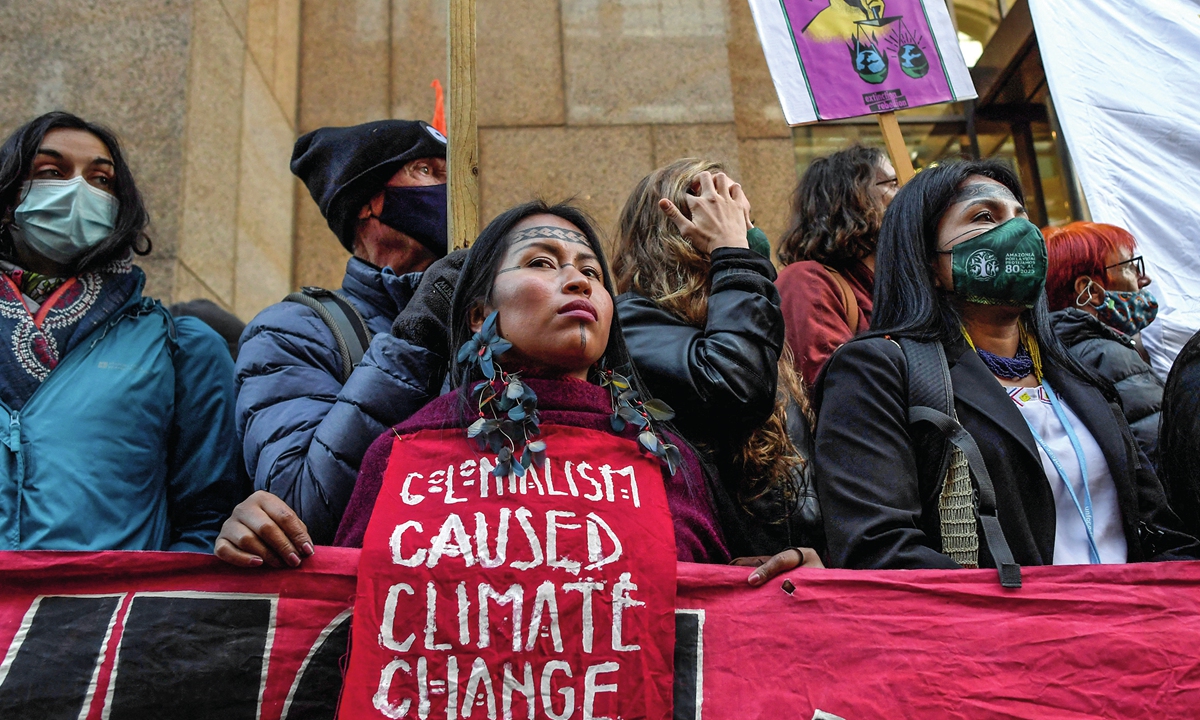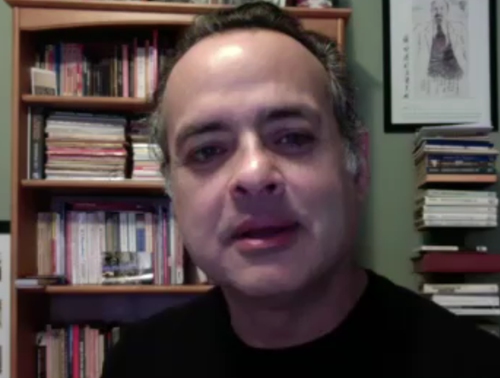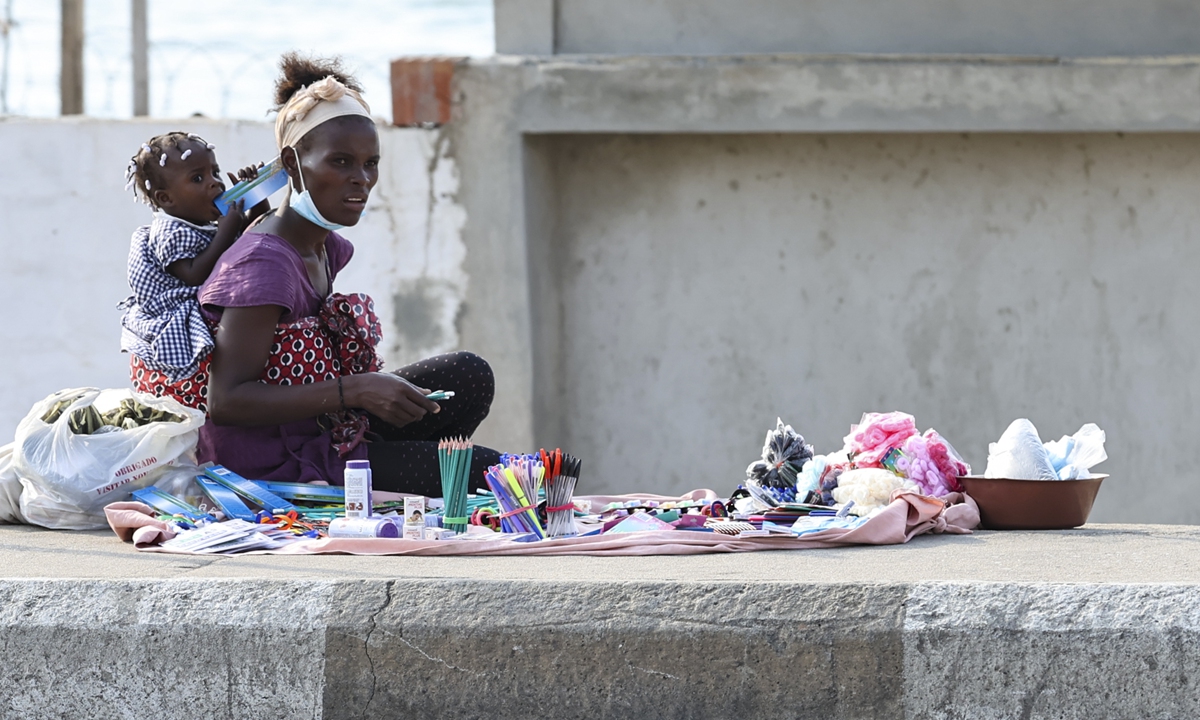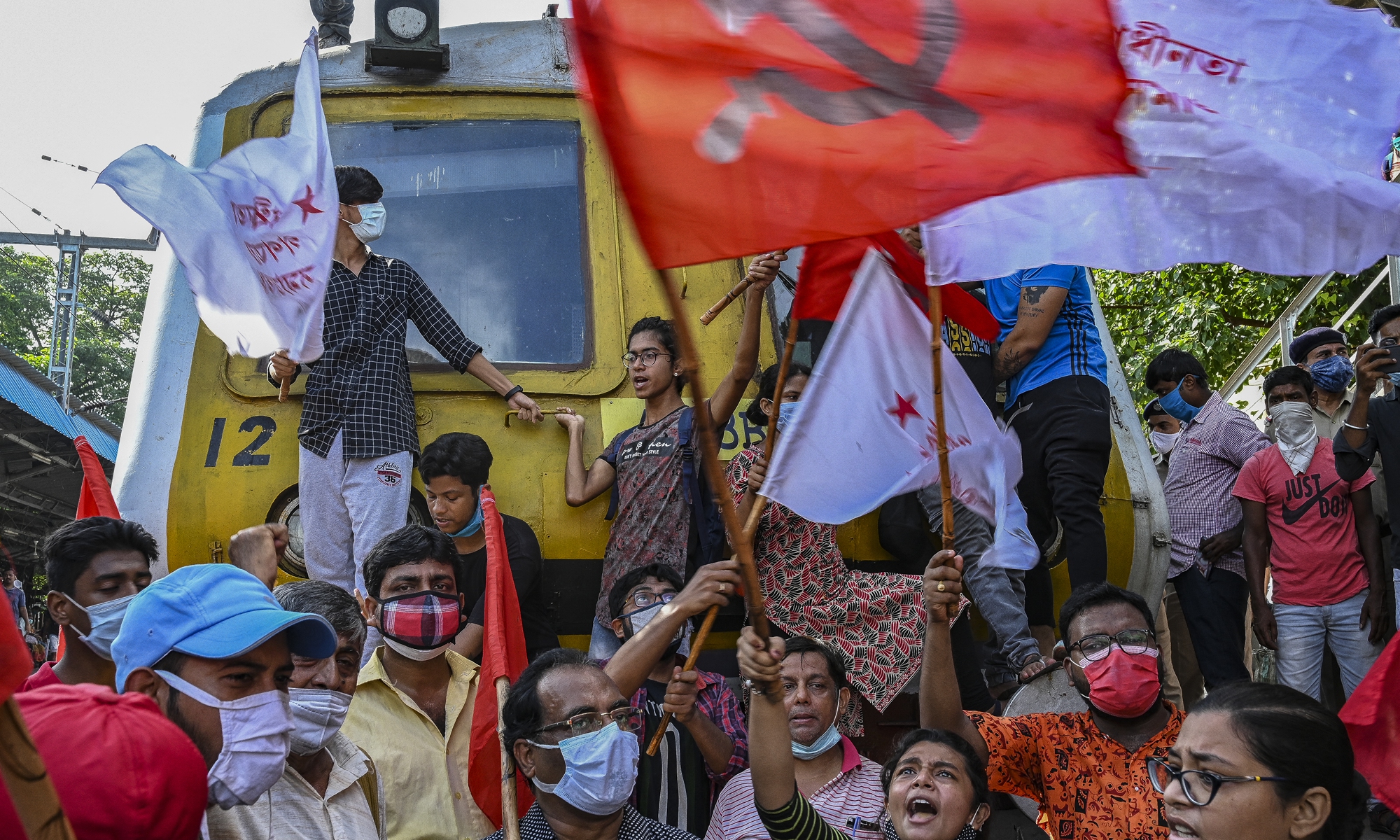
Protesters gather in the JPMorgan Chase Glasgow Headquarters in Glasgow demanding that the bank stops all financing of fossil fuels on November 10, 2021, during the COP26 UN Climate Change Conference.Photo: AFP
Editor's Note:
During the 26th session of the Conference of the Parties (COP26) held between October 31 and November 12 in Glasgow, the UK, a short video clip of Indian Marxist scholar Vijay Prashad's speech went viral. In the video, Prashad accused Western countries of robbing the wealth and resources of developing countries through means such as colonialism and encouraging a reliance on fossil fuels among developing nations. After their journey to becoming fully developed nations, Western countries have doubled back to place the culpability of current pollution crises onto developing countries.

Vijay Prashad Photo:Global Times
What made Prashad deliver such a speech in Glasgow? What is the essence of Western countries' behavior in his eyes? Why did he say India needs socialism today? And what is his understanding of China and India's relationship? Recently, the Global Times (
GT) reporter Bai Yunyi conversed with Prashad (
Prashad) to learn more about his experience and thoughts on such issues.
What really matters
GT: What made you go to Glasgow and deliver that speech at the COP26 conference? Could you share more behind-the-scenes details with us?
Prashad: I had reported a story in Mozambique about oil companies. One is a French company, Total; while the other is an US company, Exxon Mobil. They have found the biggest offshore oilfield and a natural gas field in Mozambique, Africa.
People who lived just off the field in Cabo Delgado, which is the poorest province in Mozambique, started an uprising in 2017. They insisted that, "we are so poor. We can see this natural gas development. We are getting no benefit." They were upset. The French and American armies were to intervene. They didn't, but struck a deal with the Rwandan army which went in and crushed the uprising. I was very sad about this.
So that morning in Glasgow, I was in the queue to get a PCR test. There were some oil company executives behind me. One of them saw my press pass. He said, "What are you doing here?" So I told him the Mozambican story.
I said that I have seen poor people in the shadow of a natural gas field who will not even be able to eat. This upset me, so I had to come and talk about things of that nature.
But he said something to me that triggered that speech. He said, "You are right. But nobody cares. You're not lying. You're not wrong. Everything you say is correct, but nobody cares. They don't care about those people in Cabo Delgado."
That got me a little annoyed. And I have to tell you honestly, when I went back into the session, and they gave me my turn to speak, I thought, "I'm going to just say what I believe."
GT: Your speech at the COP26 went viral on Chinese social media. Did you receive any feedback from your Chinese counterparts? All things considered, how do you feel about the speech in hindsight?
Prashad: The truth is that this little segment you see is from a number of speeches that I made in Glasgow, which have gone viral everywhere including in India, on the African continent, in the Caribbean, and in Latin America with the use of subtitles.
I went into a community in Venezuela. And a woman who is the leader of the community said to me, "You're the climate change guy." I thought "Goodness, I'm 54 years old. I've done a lot of things in my life, and I'm going to be defined by this five-minute clip."
It's very exciting, to be honest, that so many different kinds of people are engaging with what I think is really important - the colonial structures and a neo-colonial mentality.
It's not that I said something new, but that it was a matter of what people are already thinking. And it leads me to feel that lots of people are frustrated with the current world order. And we want something different.
Arrogant 'lecturers'

A woman carries her child on her back while selling goods on the street in Luanda, capital of Angola, on October 19, 2021. Luanda is considered one of the oldest colonial cities on the African continent. Photo:IC
GT: As you said, a segment went viral on social media because it was a matter of what people are already thinking. What do you think the reason for the anger toward the West is? Why do so many people feel frustrated by the current world order?
Prashad: I think that [is because] we are fed up with being told what to do by leaders from Washington, London, and Paris, who claim to be in a way better than we are. They claim they are the best judges of everything and have all the answers to human rights and democracy. Their attitude is very frustrating to people.
Consider this: The US has the highest per capita incarceration rate in the world. Why do they still keep lecturing everybody else about human rights?
We're all struggling to make better things happen. But they "lecture" us as if they have all the answers, and I think [that's why people] have been frustrated for such a long time.
GT: You also talked about the "permanent colonial mentality" of West in your speech. Where do you think their colonial mentality comes from? Why do you think Westerners' attitudes toward developing countries today are still the same as they were in the 19th century?
Prashad: Let's be frank. It's very difficult to get rid of the West's colonial mentality. It's like patriarchal mentality: Over the centuries and in many societies, men have thought they are superior to women. It has taken a long time to teach men that believing that women are inferior to men is a crazy idea. Similarly, it is going to take a long time to transform Westerners' colonial mindset, which has been there for five or six hundred years. For over 500 years, they thought that we are lesser people. They therefore think they can go and bully us, telling us what to do.
In China there was the Opium Wars in the 19th century, which the British tend to call "Anglo-Chinese Wars." However, the Chinese ships didn't go and start a war in England, and the Chinese did not bombard England. They were the wars that the British imposed upon China. These were no "Anglo-Chinese" wars but British wars.
I always get annoyed when Westerners say "the Vietnam war." There was no "Vietnam war" but a US war imposed upon Vietnam. There's no Iraq war but another US war imposed upon Iraq. It's very hard to get this attitude out of their heads.
The West needs to recognize the history of colonialism. But they seemed to have amnesia about this - France, the UK, and the US - nobody ever accepts their past. The British, for instance, are currently very upset about what's happening in Hong Kong. But remember, the British held Hong Kong as a colony. There was no democracy there under British rule. Why don't they recognize that? When Chris Patten was the last governor of Hong Kong as a British colony, what democracy was there for Hong Kong people? And yet they are busy lecturing the Chinese, which sounds very interesting to me. They don't even possess self-awareness about their own history.
The British directly ruled India for at least 200 years, during which time there was no democracy. When the British left India, only 13 percent of the Indian population was literate. So now don't lecture us about our government.
The West's attitude toward us is that of infantilization. They feel they have to cajole us to make us behave. It's a long-term issue, and one that's going to take time to purge such attitudes from Western thinking.
India needs socialism
GT: You are a Marxism and socialism scholar. Can you tell us what it is like to be a Marxist in India?
Prashad:India has a very long communist tradition. There are several communist parties in India. The largest communist party is the Communist Party of India, which has more than 1 million members. Until recently, Marxism was one of the dominant forms of thought in India. Especially in the field of economics, Marxism held its own.
I have been reading Marx's works since long ago. As you can see, I have many books on socialism on my shelves, many of which I bought from the Soviet Union. When I was a little boy in 1981, like many of my contemporaries, I bought three volumes of Capital in Calcutta.
However, then we were faced with the collapse of the Soviet Union, an event that made us feel defeated for a while, and since then, there has been a lot of pressure to be a Marxist. To be honest, things are not easy in India for socialism today, because the government has a certain sort of religious perspective, regarding politics. I'm not in favor of religion in politics.
However, this year, millions of farmers in India held protests against farm reform bills. In a way the farmers showed the vitality of Marxism because this was authentic class struggle.

Indian activists and farmers try to stop a train at a railway station in Kolkata to protest against the central government's agricultural reforms on September 27, 2021. Photo: AFP
It has been a very powerful year amid the COVID-19 pandemic. We had one of the world's largest mass movements in which the government had to repeal its laws. That means the farmers won. If you want to know what it feels like to be a Marxist in India, ask the people who has walked among the farmers.
GT:Do you think today's India needs socialism?
Prashad: What do we want as ordinary people? I want to live in a society where people are not hungry or illiterate, where people have shelter and access to high quality education, and access to the internet and electricity. But today, hundreds of millions of Indians don't have these things. If capitalism can provide them such living conditions, I would become a capitalist, but capitalism cannot do it. Only socialism can lift everybody up from the brink of starvation. We see that it has actually been done in the "Chinese experiment"— I use the term "Chinese experiment" a lot because innovative Chinese people are constantly trying different things. I really appreciate that.
I think that China's attempt to eradicate poverty is probably the most important thing that's happened in a long time in the world, because it showed countries like India it can be done in a poor country.
I'm not Chinese, but I am proud of what the Chinese government has done. I think socialism is necessary in India. Is it easy to make socialism in India? No. Is it easy to make socialism in the US? No. It's going to be very difficult, but it worth the struggle.
GT: Some Indian politicians and scholars see China as a big threat. They think India should stand with the US to confront China because of current border tensions between China and India. What is your view on this perspective?
Prashad: I don't think the current border tensions are important. China had a border dispute with the USSR that was only resolved 10 years ago. And today, Russia and China have one of the closest global relationships. Border disputes can be solved. It's the underlying political problems that are important.
Right now, the Indian elites are more interested in an alliance with the US. This is actually bad for the people of India, because India needs to get involved in the "Asian era."
Why should we imagine the Belt and Road initiative (BRI) as being solely a Chinese project? We have to imagine BRI as being an Asian project. India needs to also be involved in this investment in infrastructure and so on.
The elites, however, feel that the road to freedom comes through Washington. I think India needs to have a non-aligned foreign policy. India should take a neutral position. India is a great country and doesn't have to be in anybody's camp. Indian ruling elites should have a more open-minded attitude toward business, commerce, and human freedom.













